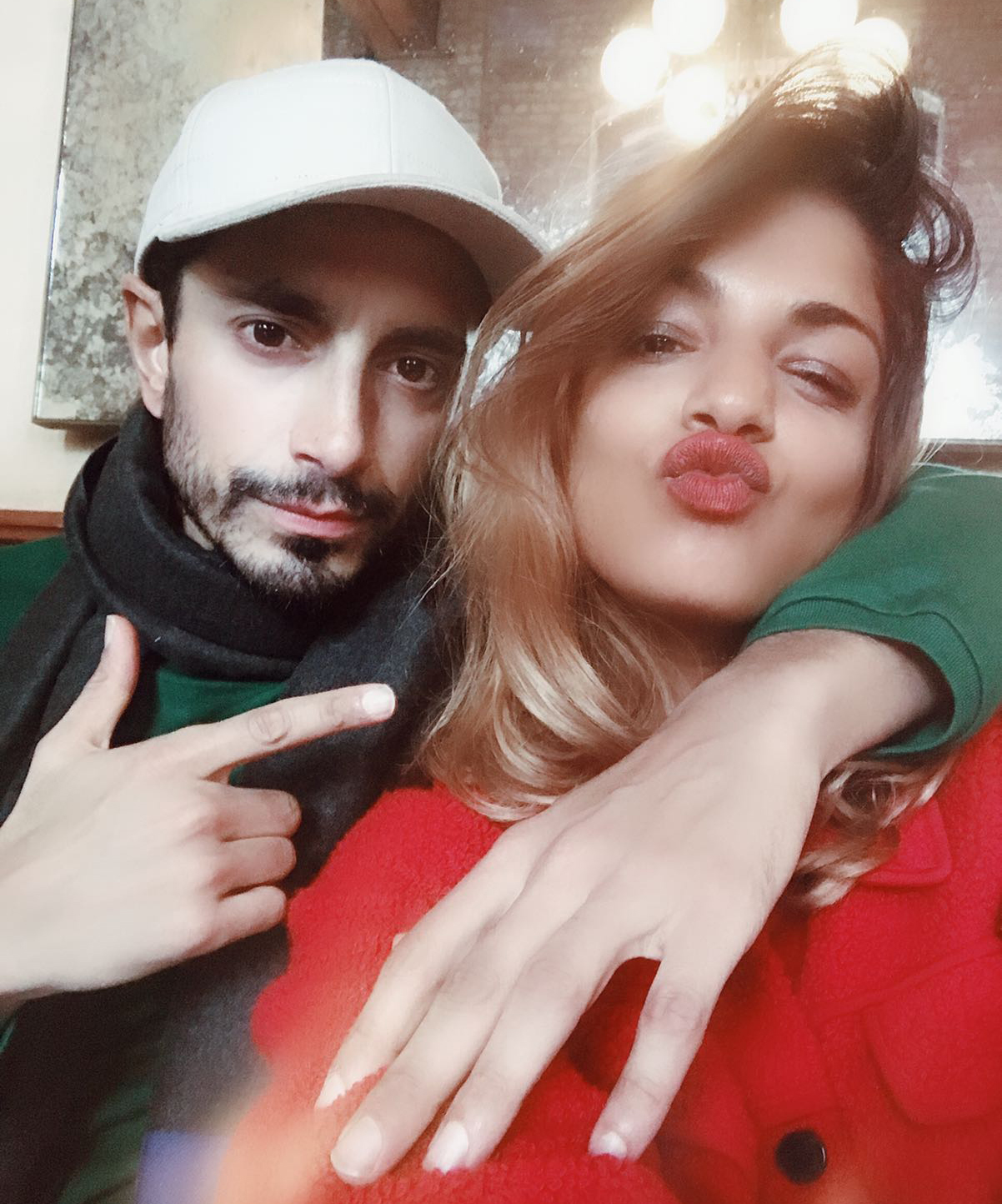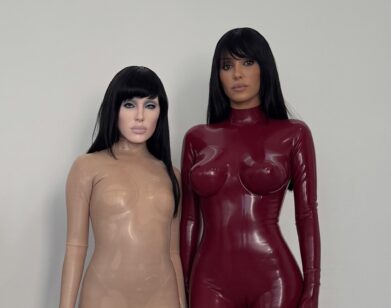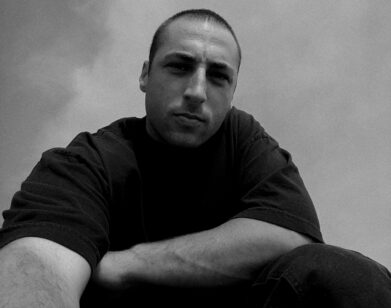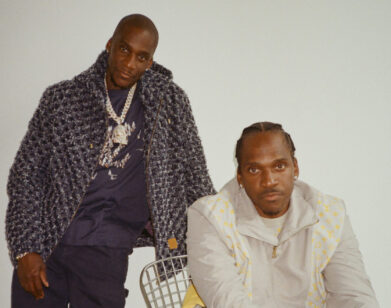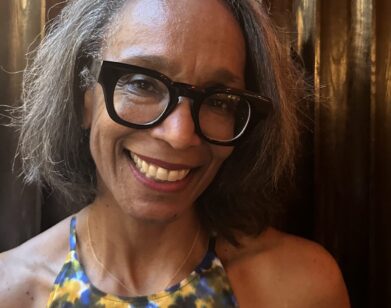M.I.A. almost gets arrested, meets Riz Ahmed for lunch
At first, the conversation I’d arranged between pop’s agitprop agitator M.I.A. and Swet Shop Boys MC and actor Riz Ahmed got derailed. M.I.A., real name Mathangi Arulpragasam, or Maya as she’s known to friends, was being threatened with a trip to the clink. Late for a meeting, Maya’s driver was hoping to beat traffic by driving half on the road, half on the curb of Madison Square Park in Manhattan. New York’s Finest weren’t too pleased.
RIZ AHMED: How are you doing, Maya?
M.I.A.: How are you?
AHMED: Good, man. It’s really good to finally talk to you. Where are you now?
M.I.A: I have just been pulled over by the cops in New York City, and I’m in a car while the police are—
AHMED: [laughs] So you’re being pulled over right now?
M.I.A.: I’m right now being pulled over, so I’ll get a couple of words from the officer in a minute. I’ve just been arrested in New York.
AHMED: You’re funny. I’m in New York, too, man. They told me you were in London. Why didn’t we do this face-to-face?
As M.I.A. dealt with the police, a date was arranged to meet with Ahmed the following day at the Wythe Hotel in Williamsburg, where the conversation continued over kale curry. Maya, 42, was in New York to promote Matangi/Maya/M.I.A., a new documentary directed by her Central Saint Martins classmate and long-time friend Steve Loveridge, which will be released this summer after a marathon journey to inception. She handed over 700 hours of personal footage to Loveridge almost a decade ago. He pieced it together over the intervening years—at one point stating that he “would rather die” than finish the project when her label, Interscope, barricaded its release and forced the trailer’s removal from YouTube in 2013.
The documentary was set to feature talking heads like Kanye West and Julian Assange, as well as Interscope co-founder Jimmy Iovine. None appear in the final version. Instead, we get a piecemeal portrait of the provocateur, stemming from her British upbringing and dipping into conversations with family about her father’s link to Sri Lankan guerrilla group the Tamil Tigers and touching upon other significant moments in her career: her signing to XL, the making of her omnipresent pop trigger pull “Paper Planes” with ex-boyfriend Diplo, and the infamous middle finger to the world at the 2012 Superbowl and subsequent million-dollar lawsuit.
More important than acting as a monolithic biography of the singer, it positions M.I.A. as the genre-contorting, boundary-pushing, take-no-prisoners British-South Asian woman that she is. Over the years, sounds and visuals that she pioneered in the early ’00s have wormed their way into the music and presentation of other stars, with no credit paid to their originator. It’s difficult to capture everything that M.I.A. stands for, but Riz Ahmed—an outspoken British-Pakistani and rapper himself—gives it his best.
RIZ AHMED: What did you order?
M.I.A.: The kale curry.
AHMED: The kale curry?
M.I.A.: It’s just not right.
AHMED: That’s basically probably a fair representation of where we’re at in life right now.
M.I.A.: That’s true. Curried kale.
AHMED: That’s the name of the next album, isn’t it? That’s the collab album that we’re doing.
M.I.A.: With a poached egg on the top, and crunchy bits.
AHMED: How you feeling, man?
M.I.A.: Yeah, a little bit like that thing we just ordered. Split between two worlds.
AHMED: That’s nothing new with you though, is it?
M.I.A.: No, it’s not. I don’t know because I got really … I don’t know if I should say this.
AHMED: Tell me, love.
M.I.A.: I got a bit stoned last night so now I’m having those kind of like—
AHMED: Paranoia?
M.I.A.: The weird thoughts where you’re like, should I be angry at this film? Have I just been too nice about it?
AHMED: Why would you be angry about it?
M.I.A.: I don’t know.
AHMED: No, I think you’re being paranoid.
M.I.A.: Yeah, but would you put your family up there? Not my choice. It’s not my choice.
AHMED: You made a decision quite early on in your work and how you talk about your work to mention your family. Do they get pissed off? Because my family get pissed off when they go, “Why are you talking about how we grew up,” or “Why are you saying we grew up in this area, say a different area that sounds nicer.” So was it just off their radar what you were doing and what you were saying? And when it came on their radar were they like, “Yes, you’re representing,” or were they like, “Why are you talking about our business out there?”
M.I.A.: You mean why did I start talking about being refugees?
AHMED: No, I’m not saying why, I’m saying how did your family react?
M.I.A.: I don’t know how it went.
AHMED: Were your family pissed that you were talking about them, talking about your upbringing, talking about your dad? You named your albums after your parents. Asian families can be a bit like, yo, dirty laundry, what are you doing?
M.I.A.: Naming a random album that’s full of club music after your mom is not necessarily talking about my mom.
AHMED: No, sure, but in your lyrics and in interviews you did, innit?
M.I.A.: Not in my lyrics. I didn’t talk about it in my lyrics but I talked about it in my interviews because people were like, “Oh, are you authentic?” And at that time I was like, what the fuck is authentic? And they were like, “Are you a gangsta because you from the hood?” And I was like, I don’t know what constitutes being a thug because yes, I have all of the genetic makeup to become one, in where I come from or how I’m living but it’s more complicated than that. Then I had to explain a bit. But because I didn’t really know my dad I couldn’t talk about him, because if I grew up with my dad—
AHMED: Then you’d feel weird exposing him in a way.
M.I.A.: Yeah, but I didn’t know about him and I felt that that was okay because I knew as much as anyone else knew. In fact, most of the information I got about my dad was already what existed out in the ether. Like people would come up to me and be like, “Did you know your dad did this?” And that’s what I knew. So it was public information.
AHMED: And was your mom pissed about it, or were your siblings like, “Maya, why are you talking about our family? Why are you talking about our dad?”
M.I.A.: Yes. In the beginning they were like, “Oh my God, this is so embarrassing. Why are you saying that we are poor?” And I’m like, “’Cause you are.” And then they’re like, “Yeah, but that’s not the deal. We don’t want to talk about that.”
AHMED: Part of being an artist is about really embracing who you are and talking about your own experience and your own life but that can alienate the people in your life. Is that something you’re still dealing with?
M.I.A.: Yes, what we went through wasn’t our choice but it was something you go through. To some extent you have to be self-sacrificing in order to shed light on the complications, which now is needed even more than ever. My mom and dad are probably over it.
AHMED: There is always a small cost, isn’t there?
M.I.A.: Yeah, but the cost is fame. To me, my fame damaged my family more than me talking about my family.
AHMED: Because they’re just constantly under a spotlight in the community and more generally?
M.I.A.: No, no, no, no, they just hate the fact that I’m famous. My mom is not but my mom kind of is, because she’s just religious and spiritual so she’s like, “What is that thing?” But you know what? I don’t feel bad about it because sometimes even—there’s certain things like money or fame, and with the Sri Lankan thing it’s very important because we’re immigrant culture; Indians are the same. You come over, then you become doctors and everyone’s got this sort of Cambridge-educated façade to keep up with.
If you think about why they would be upset it’s because they’re like, why are you shaking up the Cambridge, Oxbridge [trajectory] that we’ve set since the ’50s of what you’re supposed to do, and the institutionalized brown person who’s happy with conforming and just keeping your head down. My mom worked for 30 years for minimum wage and never asked for a raise. Through the fucking ’80s, ’90s and the 2000s her wage has stayed the same, which is why I lost my shit. I was like, “What are you protecting anyway? What are we all protecting? What’s the point?” It’s a larger conversation, but I know that it’s weird about my family.
AHMED: You’re ahead of your time in lots of ways and you’re representing this broad, umbrella-like, Third World, ratchet kind of resistance in pop culture.
M.I.A.: It was very ratchet.
AHMED: And it was cool. It was really, really great—ahead of its time. I want to talk about two things. One is about the U.S. versus the U.K., because I feel like you were understood here quicker than you were understood in the U.K., and that includes me. Because the brown experience in the U.S. is much more middle-class, people that are familiar with the aesthetics of art school, for example. Whereas, I’m not going to offend you by saying this, but me or my cousins or my boys, we weren’t necessarily bumping your shit. We were listening to RDB, bhangra garage and we would be like, “Who’s this? Is she posh? Is she a middle class art school girl?” And you were misunderstood. I watched this documentary and I was like, “Fucking hell. I wish I knew more clearly—”
M.I.A.: What I was.
AHMED: Is it the Internet? Or is it to do with how America—even though the reality of America, a lot of it is built on white supremacy historically and still the idea of America is one that makes space for the immigrant story? Like Scorsese talks about Italian-Americans. They put it center stage. Woody Allen: Jewish-Americans, center stage. If you try and be anything hyphenated British, you become a niche self space.
M.I.A.: That was the case.
AHMED: Is it because America’s more ready for—[waiter comes and delivers food] Thanks.
M.I.A.: They give you a lot of food in America.
AHMED: I fucking know.
M.I.A.: It’s insane.
AHMED: Tell me, why do you think you blew up here more than the U.K.? And do you think that says something about the difference in race dynamics or pop culture dynamics in the U.S. versus the U.K.?
M.I.A.: I’ll tell you why. In London, none of my managers, I have 13 managers, none of them are in that film.
AHMED: I’m sure you’re very easy to manage.
M.I.A.: None of them are in there and they were like, “If I’m in that film Steve, I’m gonna sue ya.” And basically [the director] Steve removed every single person that’s part of the story. He took so many important people out, and then he just had the skeleton—
AHMED: Why is that? Do they all hate you?
M.I.A.: Because everybody’s like, “If I’m in a film, I’m gonna sue you, and you can’t use my footage.” Because that’s how it went, that’s what Steve told me. When I said to Steve, “How come some people got off lightly?” It got more complicated than what is on the camera, and Steve said you can’t put them in there, they would’ve sued me. So by removing everybody else, you still got a story, which is pretty amazing, but up to the “Paper Planes” bit, when you are being that immigrant person—and I feel like I trail-blazed a lot business-wise as well.
AHMED: How so?
M.I.A.: If you listen to mainstream music now, every beat sounds like what me and [Kanye] West used to make back then.
AHMED: It was a massive, massive influence man.
M.I.A.: When I was talking to Jimmy [Iovine] as well at Interscope, he sued to literally have me in the room when he hired and fired people to re-modernize Interscope. So I came at the back of when he had gotten over the whole 2004 Timbaland era, because he had Timbaland as a producer on Interscope, and I came after. I came digitally to an industry that started from selling cassette tapes, so when they signed me, they were like, “Okay, this girl is the future of music.” So they fired everybody at Interscope and had me in meetings, and Jimmy basically said, “Right, she’s the bang and we’re going to change our entire operation to run it the way that she’s talking about,” and that’s when they transferred the digital—
AHMED: And what was the thing you were talking about? Having a coherent message, having a whole world around your music?
M.I.A.: Yeah. It was more about presentation and digital downloads, MP3s, promoting on Myspace and social media—
AHMED: Delivering a 360 kind of—
M.I.A.: —talking, being active with fans. It’s not really a 360 thing, it was transferring from analog to digital; it was no longer about selling CDs and doing VH1 and MTV, it was about getting underground clubs and the things people wore.
My first manager [and I] had a massive falling out. I said to my manager, I was like, “I’ve got to go to America” and he was like, “No Maya, you can’t do that. You’ve got to take your time. You’ve got to break London first, then we’ll take you across.” And I fired him on the spot and got on a plane and moved to America. That’s what I did.
AHMED: What gave you that confidence to do that?
M.I.A.: I don’t know, but it cost me my friendship with him, but at that time I said to him, “I’ve got to go, because my conversation’s not with England. It is with America.” If you’ve gotta fight, you’ve got to do that. Because they are making the laws and the goalposts on who’s acceptable and who’s not and what fight’s acceptable and what’s not, like defining foreign policy back home.
AHMED: You’ve got to go into the belly of the beast, in a way.
M.I.A.: Because the best minds move here [to the U.S.]. They just do, it’s inevitable.
AHMED: How do you feel about that? Because I just went back to Pakistan for the first time in 13 years. I always wrote it off. Growing up it was like, “Are you Pakistani or are you British?” Now for younger generations it’s: “Are you British or are you Muslim?” We used to go up and down in our rented Beamers, flying the flag, in salwar kameez, chanting, “Pakistan’s in the [house]!” in all our rude boy theme. And then you go to Pakistan and you’re like, “I don’t fit in here. At. All.” And since I was 18, I realized, it’s not about me picking this or that, it’s about a third space. I’m a third culture kid. My whole life’s mission, my creative manifesto, is about taking that No Man’s Land—
M.I.A.: Curried kale. Coming back to curried kale.
AHMED: Exactly. Curried kale, baby.
M.I.A.: There’s a really interesting story about Brooklyn that I would like to share. When I was last here in 2013 and ’14, at that time I was writing the Matangi [2013] album, which is very Hindi, but I went to this Hindu temple to kill some time, teach kids some drums. I took [my son] Ikhyd there and they were giving a lecture on Bhagavad Gita and I was like, “Oh, maybe I should learn about what this is,” because I knew nothing about Hindus apart from a couple of stories.
AHMED: Why? Is that because of the Tamil tribe or Marxist vibes—
M.I.A.: No, my dad’s a Catholic and my mom’s a Christian.
AHMED: Oh, I didn’t realize you had a Christian background.
M.I.A.: Yeah, and my grandma’s a Christian. So we come from a very Christian background. I did live next to a temple and I remember things that they might have taught me at school but it’s very far away, I wasn’t paying attention. So I went to Brooklyn and I was sitting through the lecture and I saw this man in the corner of the room. He was sat on a pedestal and was meditating. I watched him and I watched him, for two fucking hours he was up there, meditating, and I was like, “Wow, that man’s amazing,” because he was testing himself in a very crowded room.
Everyone was singing, dancing, people were eating. I had been there for the whole day and then I went back to London and I realized that I had the Bhagavad Gita on my shelf and when I opened it, on the back page was that man that I saw in the temple! And I was like, “Oh my God, this is the guy that translated the Bhagavad Gita for the first time, from Sanskrit into English,” and I showed my uncle and said, “I saw this man, I think I met him in Brooklyn.” My uncle’s like, “No, that guy’s been dead for 30 years, it can’t have been him,” and I was like, “I swear to God it was that guy.” So if it was some sort of vision that I had of this man or it was this man manifested or he’s just around—
AHMED: Were you blazing that day?
M.I.A.: No, I was not. But I believe that maybe—
AHMED: You can have visions.
M.I.A.: Or, he’s obviously a spiritual leader so he must know how to exist in some other ways that we don’t already know. Anything is fucking possible in Hinduism.
AHMED: Can you remove yourself from Sri Lanka and still be powerful in being a kind of mongrel, mutant Sri Lankan? Can I remove myself from Pakistan, India, and still be? Part of me thinks that it makes you lost and confused but that feeling of being lost and confused and being a seeker is fucking inspiring because it makes you restless, it makes you want to create. The X-Men need to go make their own weird, custom uniforms, know what I mean?
M.I.A.: That’s what I did.
AHMED: In a way, could your music and could you have only come from London?
M.I.A.: Yes.
AHMED: Because in Sri Lanka you wouldn’t be doing that. In Pakistan you wouldn’t. It’s London, innit?
M.I.A.: I 100 percent said that from day one. I was repping multiculturalism which was the best thing about London.
AHMED: Now we’re in this weird moment due to Trump and people are like, “Yo, go on, tell your story. Do it now.” But sometimes that brings such a burden. We’re expected to carry the burden of representation for our whole communities and I don’t want to.
M.I.A.: I get what you’re saying, you can’t please everybody and that body of work could take a lifetime and you still not achieve it, right? It’s impossible. It is about representation to some extent, but—
AHMED: It is. You’re aware that you’re repping. I’m aware that I’m repping.
M.I.A.: But I wish it wasn’t.
AHMED: I was going to ask—
M.I.A.: No, it’s a burden. It’s a burden.
AHMED: How much of what you are doing is out of creative curiosity versus “I’m just a fucking star and I deserve it, ego artist.” All artists have a fucking ego, you assume the world needs to hear what you have to say. You’ve got an ego, so have I, or we wouldn’t be like, “Oh, people should listen to us talking at a fucking table, eating curried kale.” Or how much of it was repping? Because I’ve been thinking about this a lot, for years.
M.I.A.: No. I was—
AHMED: Because you were videoing yourself; you knew you were going to be something special.
M.I.A.: No.
AHMED: Why were you doing that then? What was all that about?
M.I.A.: I have no fucking idea!
AHMED: Not blatantly, what it looks like to me.
M.I.A.: I’m sorry it looks like that to you, but that was not the case. But that’s what’s interesting, is I was around musicians for five years of art school or whatever and never had that thought, and then I go to Sri Lanka and the last shot [in the documentary] is my grandma like, “Go home and be a singer.” I didn’t even know that and Steven [Loveridge] got a translator and that came up. It was a shock to me when I saw it. I was like, wow. And then obviously that must have done something, some weird awakening that I was not even feeling on camera at the time.
AHMED: I love that. You can’t give away the ending, man, spoiler alert.
MATANGI/MAYA/M.I.A. WILL BE RELEASED LATER THIS SUMMER.

